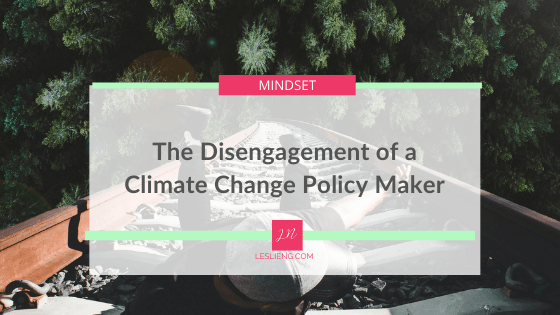
I am a climate change scientist. I am a policy analyst. I am a sustainability practioner who is trying to champion a sustainable path forward for our existence and all the biodiversity left in this world and I am becoming disengaged with climate work.
It’s not that the frustration of years of working to create policies and gather political will yet still seeing very little bold action that has exhausted me, or the unhelpful discourse on economy vs environment that has left me feeling hopeless. It’s not the climate grief that crippled me in an existential crisis that has left me ready to give up and forget about it all.
What has left me feeling really disengaged has been the lack of soul in the discussions on how to solve this problem. Climate change is a complex problem. It is not one that can be easily solved by some innovative new technological solution. We aren’t just going to sequester our way out of this problem.
What’s Missing
Climate change is a problem that ultimately involves humans and all the complex social, emotional, cognitive and behavioral aspects that are emergent from being human and interacting with the material parts of our world. And yet, our discussions of how to solve this problem never acknowledge that. There are rumblings of how we need to be inclusive and equitable with our climate policies when we create new policy or propose new changes but only to the extent of framing the message and sometimes to incorporate a piece of feedback but the interaction is still rather transactional, the changes tactical not cultural. There is very little soul or human-ness in these discussions as the focus on strategy becomes more urgent and technical.
In fact, as the urgency of this problem becomes increasingly desperate, there is a tendancy to want to sharpen one ultimate strategy, unfortunately becoming ever myopic and divisive in the process. We argue over the effectiveness of various policies and the merits of funding this problem over that when they are all interconnected.
Meanwhile the souls of people are starved for a feeling of wholeness and purpose. We crave a soulful life and a connection to others that is regenerative, loving, and creates a strong sense of belonging. It’s the kind of fulfilling soulfulness that comes from acknowledging all the parts of you that exist and finding belonging and acceptance within. It’s more than finding your purpose. It’s living in a wholeness that does not need to hide or cut away the parts of you that society has deemed not ‘normal’, or ‘unacceptable’. And it’s also the kind of wholeness that recognizes the interconnections we have with all things around us.
The Work We Need to Do
We have created a world built on oppression that is deeply traumatizing for a large number of people, where one’s wholeness is not acceptable and not welcome. We have created a world where there is a need to separate your physical self from your spiritual self because it is not tangible or visible. The soul is not real and must contort to fit a narrative. This Cartesian duality is a significant wound, leaving a legacy of trauma and a sea of people feeling broken, and disconnected. So when we talk about the climate problem as if it were just a policy problem, or an education or engagement problem, we’re missing some soul.
We are missing our spiritual self that was cleaved off because of a cultural narrative that deemed that part of us worthless. As a result, the love and knowledge of our interconnectedness that could help heal our planet are missing from the discourse.
The discourse today is much more focused on the tactical strategies that we need to put in place, but they’re all very technical. Green building policies, renewable energy policies, carbon taxes, electric vehicles and so on. Even as we start to center equity in these discussions and try to address the systemic issues, what about the trauma on wholeness, what about room for the soul? I find the discourse lacking and empty when my wholeness cannot be at the table.
What we need is some collective healing. What if soul healing strategies were legitimate strategies? As effective as your green building policy. What if we also repaired our relationships with our souls and each other? Instead of relegating these practices and ways of relating to the field of ‘woo woo’ niceties or desparate practices for the weak minded, what if we integrated these practices into our collective work to fight climate change.
What if, by healing the disconnection between our whole self, we reconnect with the environment around us, healing it, and treating it with the love and respect it deserves for providing us the air we breathe and the bounty we have. What if we did invest in some collective healing?
In Summary
Climate change is a complex problem, and we need all angles of strategies to address it, but the singular focus, or reverance for only visible, tangible solutions is a detriment to the progress we need to make and also just another sign of how desparately we cling to our dominant cultural narrative. So I find myself disengaging from the policy-heavy climate work I have been doing for the past 15 years and searching desperately for a way to incorporate the soul healing work I think we really need to be doing.
